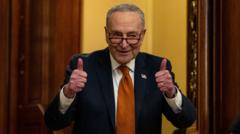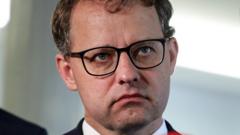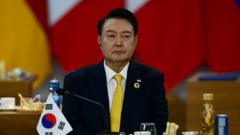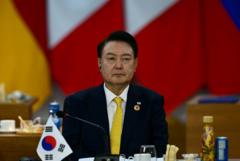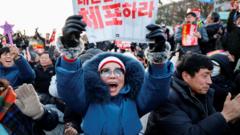President Yoon Suk Yeol announced martial law, citing a crisis caused by an extensive impeachment campaign against government officials by the opposition. He accused the Democratic Party of undermining state functions and declared a state of emergency to restore order.
South Korea's President Yoon Declares Martial Law Amidst Political Turmoil

South Korea's President Yoon Declares Martial Law Amidst Political Turmoil
In an unprecedented move, President Yoon Suk Yeol has declared martial law in response to ongoing political strife and multiple impeachment motions against government officials.
President Yoon Suk Yeol made a groundbreaking announcement on Tuesday night, declaring martial law as a response to the escalating political crisis in South Korea. His unannounced speech revealed the depths of turmoil faced by his administration following an unprecedented number of impeachment motions initiated against government officials since he took office.
In his address, Yoon expressed deep frustration over what he described as the continuous obstruction of governmental functions by the opposition, particularly the Democratic Party. Since the inauguration of the 22nd National Assembly in June, there have been 22 impeachment motions, with an additional 10 planned. The president condemned these actions as an attempt to paralyze the judiciary and intimidate judges, which jeopardizes the very foundation of the nation’s governance.
Yoon criticized the Democratic Party for drastically cutting the national budget, calling it a deliberate move to destabilize the state. The budget reductions, which included 4.1 trillion won cuts affecting disaster preparedness and childcare support, were painted as a manipulation of state finances that risked turning Korea into a “drug paradise.” He highlighted the potential consequences of these cuts, suggesting they compromised public safety and national security.
The president characterized the opposition's tactics as acts of insurrection designed to disrupt the constitutional order of the free Republic of Korea. He portrayed the National Assembly as a "den of criminals," arguing that its efforts to impeach government officials were an assault on liberal democracy itself.
As tensions escalate, this declaration of martial law poses significant implications for South Korea's political landscape. It raises questions about the balance of power and the future of governance amidst an increasingly polarized environment. Observers are left to wonder how this unprecedented action will impact public sentiment and the ongoing political discourse in the nation.

